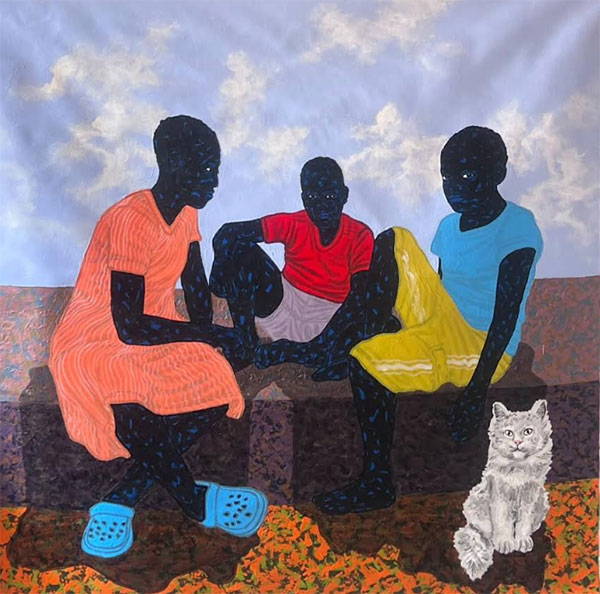
Working with figurative portraits and vivid expressive palettes Bwambale and Mugabe relive intimate memories of their childhood experience and their present immediate surroundings as a symbol to the subject of social cultural heritage conservation
ARTS | DOMINIC MUWANGUZI | There’s a singular commonality in the paintings of two young artists showcasing at Umoja Art Gallery. Beyond the vibrant colour palette which dominates their work in the exhibition My Home, My Pride, Wesley Bwambale and Ronald Mugabe’s paintings navigate the theme of heritage conservation seen through how each artist pays homage to their place of origin and childhood memories. Wesely Bwambale through working with themes of identity, memory, and beauty, constructs a narrative of the richness and uniqueness of his immediate surroundings rooted in his ancestral home and place of birth, Kasese district. The quiet serenity which permeates through his colourful and vivid images echoes the peaceful aura which runs through the rolling hills of this rift valley boarder town and its inhabitants. Similarly, Ronald Mugabe’s “deep blue-black muses” he recurrently employs in his work as symbol of his “unapologetic African and black identity”, boldly assert his uniqueness and that of the community he lives in, while challenging the stereotypes often attached to black bodies as inferior and easily marginalized.
Growing up on the streets of Kampala and later in an orphanage was ironically a big motivation to his affirmation of his black identity and the need to preserve it amidst wide raging difficulties. The artist’s dark portraits of children grouped together or playing chess are a figurative representation to the idea of living communally which is a tenet of many African communities. Within orphanages, children are taught to live together as a family in spite their different backgrounds, and this instills in them virtues of love, compassion and resilience which contribute to self- discovery. Conversely, this experience conspires to the artist’s technique of creating a backdrop of often impasto like hues which can be interpreted as a figurative allusion to his interaction with a multiplicity of life experiences while living on the streets and in the orphanage. “My life is layered with many personal experiences I got from living on the streets of Kampala and in an orphanage. This has had a lasting impact on how I perceive life and everything which surrounds me,” he says in reference to the inspiration behind the impasto technique. It may also suffice to say that the deep blue-black expressive figurative portraits are a metaphor of hope and resilience within the context of the artist’s personal experience living in the orphanage.


Not detached from his contemporary’s theme of identity and childhood memories, Bwambale’s highly textured portraits offer nostalgic memories of yesteryear as illustrated in paintings like Listening Post and Grandpa Moments. In Listening Post, the artist depicts a young man tuned in to a radio by his side. The expression on his face evokes feelings of joy and amusement which are typical of many rural folks who depend on the radio for news and entertainment. Within the context of the artist’s personal experience, as a young man in the village, one of his fondest memories was sitting next to the radio and listening to different broadcasts. The feeling of listening to the voice on the other side talking always excited as much as amused him. Equally, in the painting Grandpa Moments, the artist represents happy moments between a grandfather and their granddaughter. The deftness of the artist in capturing the emotions of his subjects in this painting, is astonishing and leaves no room to guess the type of relationship have for each other. Naturally, granddaughters are so much loved and cared for by their grandfathers and the reverse is true. Though the artist is yet to be a grandfather to profess such untamed love, the inspiration for this painting is seemingly a memory of his father interacting with his daughter, perhaps for the first time.
The convergence of the two artists themes on canvas seeps into their friendship in real life. Bwambale and Mugabe have been friends for many decades, and attended the same art school at Michelangelo school of Fine art in Wakiso district. Therefore, their teaming together in this show echoes this friendship in as much as, is a symbol of tapping into each other creative energy to create paintings layered with their rural-urban experiences. As such, ironically we’re also reminded of our personal experiences something which draws such closer to the paintings on display.
***
My Home, Pride is showing now until September at Umoja Art gallery located on plot 1800, Moyo Close, Mukalazi Road, Bukoto, behind Princess Kevina, Kampala
 The Independent Uganda: You get the Truth we Pay the Price
The Independent Uganda: You get the Truth we Pay the Price





